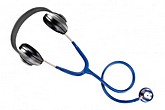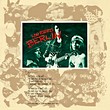|
|

From head to heart Following our retroscope series of latter years, here we go again! Here's Speakers' corner's cousin; From head to heart. Luna Kafé's focused eye on great events, fantastic happenings, absolute milestones, or other curious incidents from the historic shelves'n'vaults of pop'n'rock. Blowing our ears and our head, punching our chest and shaking our heart. Making us go sentimental, but not slaphappy. This moonth the Lunar time-machine grabs another 40-year-old; it's back to 1973, again. Despite the album title, he wasn't a son of Europe of birth, only by mind. A homme fatale, for sure, like a male Venus, like a mirror. Dressed up in furs, drenched in heroin. For a lot of parties, of androgyny, gender bending. He's waiting, she goes. Death songs for a Sunday morning? The black angel runs and runs...
Berlin was Lou's third solo album. And a bold carreer move it was, 40 years ago this very moonth. The previous year he had hit the big time with the David Bowie and Mick Ronson produced Transformer that turned him into a glam rock star. It included his greatest hit and signature song "Walk On The Wild Side" and one of his greatest ballads, "Perfect Day". Instead of surfing on the success, Lou wrote a bunch of songs about a bleak and miserable relationship, ditto lives, drugs, prostitution and violence. Well, these were not new issues for Lou. The greatest surprise was probably the music and orchestral arrangements they were coupled with. Some of the songs heavily orchestrated or as sweet as can be, the contrasts making the lyrics hit even harder. 'In Berlin, by the wall We were in a small café This is the the lyrics of the title track, written on the front cover of the album and only accompanied by a night club piano. It's about the only none-gloomy and doomy lyric part of the album. It's also the only mentioning of the town Berlin. It seems the rest of the album most likely takes place in Lou Reed's home town New York. One might wonder why Berlin? I guess only Lou knows, but one reason might be it's unique status during the cold war. If ever there was a divided city, Berlin was it. Symbolizing the diversion between the female principal character Caroline and her violent partner Jim, perhaps? Canadian Bob Ezrin was recruited as producer, arranger and keyboardist and they went to London for the main recordings. Bob had by then produced four albums by Alice Cooper, two of them very successful, and was very different from the glam boys of Transformer. He later went on to produce Kiss, Peter Gabriel, Pink Floyd, several more albums by Alice Cooper and a host of others. I guess it was Bob who brought along guitarists Steve Hunter and Dick Wagner who had played with Alice C. But here are several other session musicians involved, including the Brecker brothers Michael and Randy (horns, who used to play with everyone in the world of jazz and rock, didn't they?), Stevie Winwood (of Traffic and Blind Faith, keyboards), Jack Bruce (of Cream, bass), Aynsley Dunbar (played with the lot of the old school including John Mayall, Zappa, Bowie, drums), Tony Levin (later of Peter Gariel Band and King Crimson, bass), Blue Weaver (Amen Corner, Strawbs, Bee Gees, piano), Barrie J. Wilson (Procol Harum, drums) and more. Lou only played acoustic guitar throughout and sang. Well, sang the way he often does; talk-singing is maybe a better description. Some have critizised the lyrics of Berlin for being pretentious, others for being naïve. Well, they might occasionally be so, but then, many rock lyrics are and work because of that. The story loosely put together by the ten songs are certainly very different, very much down to earth and very sincere compared to most other rock stories - or operas - I can think of from that era. The album has also been criticized for being over-produced. And yes, some of the songs like the dramatic and occasional theatrical "Lady Day" or the at times heavy symphonic and pompous final track "Sad Song", almost in a musical vein, have the Bob Ezrin stamp all over them. "Caroline Says I" seem to be the arranger's test subject, moving in many directions; pretty conventional rock arrangment in the first two verses, then lots of strings enter, followed by a heavy choir/backing vocals period before the strings returns, then some flute starts to dominate before they all join in, but dominated by brass. On the other hand, some of the remaining songs are one the verge of being under-produced while others don't include more instruments than and reminds of your average Velvet Underground or Transformer song. Especially the mid-tempo rockin' "Men Of Good Fortune" wouldn't be out of place on any of the latter day Velvet albums with Lou and especially the start of another rocker, "How Do You Think It Feels" with raw guitar solos an all smells of Transformer. In fact "Oh, Jim" and "Caroline Says II" originate from Velvet Underground days with different lyrics and titles, though, and the title track is a new version of the song from Lou's first solo album. In the last third of "Oh Jim" the album changes mood. The arrangement is cut to the bone, only Lou's voice and acoustic guitar, almost as naked as Lennon's on parts of his John Lennon/Plastic Ono Band album a few years earlier. "Caroline Says II", "The Kids" and "The Bed" that follows are pretty sparse, too, all of them highlights of the album. The latter includes an organ and an eerie female (I think) backing vocal that almost evolves into some medieval horror movie soundtrack and make my neck hair stand on end. It's the second last song of the album, where Caroline finally commits suicide. The part where the narrator of the story says/Lou sings: 'And I said, oh, oh, oh, oh, oh, oh, what a feeling' in a voice so high-pitched that he hardly reach the fragile note in the last word, seems to me to be the peak of Berlin. The most moving moment is definitely the crying and cries for Mummy! from "The Kids"when 'They're taking her children away, Because they said she was not a good mother' and 'Because of the things she did in the streets, In the alleys and bars'. Tony Levin's bass, the most prominent instrument of the song is also worth mentioning. As is the band name The Waterboys, taken from the same song, 'And I am the Water Boy'. Berlin is certainly not Lou Reed's most representative album, in some respects it moves far from the previous one Transformer and even further from the following live album Rock'n'Roll Animal. It was a bold side-step, though far from being completely out there like his Metal Machine Music two years later (a completely different story!). Lou himself must be pretty satisfied with Berlin as he perfomed it live in 2007 with a large band and choir. It was captured and released as the DVD Lou Reed's Berlin the following year. Anyway, the original album includes some of his greatest songs and some with his most odd arrangements. Try it if you dare! Copyright © 2013 JP
|
| You may also want to check out our Lou Reed article/review: New York. |
| © 2013 Luna Kafé |
 Lou Reed
Lou Reed